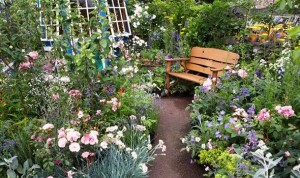Are you a carpenter or a gardener when it comes to your kids?
 OK, so I have five children. The oldest is now 24, the youngest 13. But never imagine for one moment that that makes me an expert. Far from it. I was reflecting with a friend the other day – who also has five children – and we both agreed that parenting was the area of both our lives where we feel we have failed the most. Where we have not lived up to our own expectations or the expectations of others. Where we feel the most dissatisfied with what we have achieved.
OK, so I have five children. The oldest is now 24, the youngest 13. But never imagine for one moment that that makes me an expert. Far from it. I was reflecting with a friend the other day – who also has five children – and we both agreed that parenting was the area of both our lives where we feel we have failed the most. Where we have not lived up to our own expectations or the expectations of others. Where we feel the most dissatisfied with what we have achieved.
In some moments, I look at one of my kids (not always the same one!) and I think ‘How did I get it so wrong?’. Because it all comes down to me, doesn’t it? It’s been my responsibility to make them into a certain type of adult. It’s been up to me to teach them all that they need to know, to get them to achieve all that they need to achieve. And then there’s the clever advertising that’s out there targeted at parents who are vulnerable to the suggestion that all good parents would be doing this or buying into that – giving their child the best start in life by purchasing this product or scheme. As if that’s what parenting is all about.
And the thinking of children today (some children today) reinforces that. They expect their parents to do everything for them, to get them to every football match, to provide all the equipment for each new hobby. They expect their parents to reward them for good results. Some even actually say ‘I’m doing all this for you, you know. The least you can do is pay for this holiday.’
And even worse, when they screw up, you are the one to blame. You should have done this and you shouldn’t have done that. If you’d been a better parent, then things would have turned out differently. Or am I the only one hears this sort of stuff?
Yesterday, I’d had a sneak peek ahead to Jeremiah 31 and knew that I was going to be writing about parenting today. So I guess I was reflecting on it all day. And then a friend posted on Facebook –
Why do I always feel like I’ve been a bad mum after a conversation with my daughter ?
 During the afternoon, I came across this Review of The Gardener and The Carpenter by Alison Gopnik in the Guardian yesterday, which was so interesting and fed into my thinking about this whole topic of parenting.
During the afternoon, I came across this Review of The Gardener and The Carpenter by Alison Gopnik in the Guardian yesterday, which was so interesting and fed into my thinking about this whole topic of parenting.
Then I finished off the day with a lovely evening down the end of the garden with my husband and two teenage kids, just laughing and messing on and roasting marshmallows and playing on stupid games on our phones and cuddling up under a cover and watching the fire. Just being together. Just enjoying each others’ company. It was a precious time. And I thought ‘You see, this is what it’s all about.’
So why the gardener and the carpenter? Well, it turns out this is a great illustration of parenting.
We worry too much and do too much for them: children flourish when they are given freedom. When it comes to looking after kids, be a gardener not a carpenter. The Guardian review
We try to teach them everything and do not give them a chance to discover new things for themselves. We micro-manage their lives, filling them with sports clubs and music lessons and extra tuition. We’re so focused on giving them the best start in life that we don’t allow them the time to actually live.
Gopnik feels that in modern society, all too often, we’ve got it all wrong.
To seek to parent a child, Gopnik argues, is to behave like a carpenter, chiselling away at something to achieve a particular end-goal – in this case, a certain kind of person. A carpenter believes that he or she has the power to transform a block of wood into a chair. When we garden, on the other hand, we do not believe we are the ones who single-handedly create the cabbages or the roses. Rather, we toil to create the conditions in which plants have the best chance of flourishing. The gardener knows that plans will often be thwarted, Gopnik writes. “The poppy comes up neon orange instead of pale pink … black spot and rust and aphids can never be defeated.” If parents are like gardeners, the aim is to create a protected space in which our children can become themselves, rather than trying to mould them. The Guardian review
This resonates with me. I’ve tried too hard to micro-manage my kids’ lives, I think. I’ve been too focused on outcomes. I love the idea of creating an environment, a protected, nurturing space for my kids to grow and flourish each in their own unique way.
 Parenting can all too easily become a form of work rather than a form of love. It can become results-driven, rather than about relationship. So having fun with our kids – enjoying being with them – being in relationship with them – laughing with them – acting the fool with them – encouraging them and celebrating with them – showing an interest in the small things – maybe that is what it really is all about.
Parenting can all too easily become a form of work rather than a form of love. It can become results-driven, rather than about relationship. So having fun with our kids – enjoying being with them – being in relationship with them – laughing with them – acting the fool with them – encouraging them and celebrating with them – showing an interest in the small things – maybe that is what it really is all about.
None of us are the perfect parent. Of course not. There has only ever been one perfect parent – the One who encompasses mother and father, everlasting love and unfailing kindness –
I have loved you with an everlasting love;
I have drawn you with unfailing kindness. Jeremiah 31:3
The One who is the perfect gardener – nurturing, watering, protecting…and then giving each of us the freedom to explore, flourish and make our own mistakes in our own way –
They will be like a well-watered garden,
and they will sorrow no more. Jeremiah 31:12
God describes Ephraim (Israel) as his firstborn son. Whatever mistakes Ephraim has made, God will always welcome him back. He can’t help it. Ephraim is his son.
Is not Ephraim my dear son,
the child in whom I delight?
Though I often speak against him,
I still remember him.
Therefore my heart yearns for him;
I have great compassion for him,’
declares the Lord. Jeremiah 31:20
We have a glimpse of this with our own children. However far away they stray (emotionally and physically), we yearn to welcome them back home with open arms. Whatever mistakes they have made, we love our children and remember them always and have compassion for them.
This is how God was with Israel. This is how God is with each one of us.
They will come with weeping;
they will pray as I bring them back.
I will lead them beside streams of water
on a level path where they will not stumble,
because I am Israel’s father,
and Ephraim is my firstborn son. Jeremiah 31:9
Because for God, it is all about relationship. Less about outcomes and behaviours and results and more about attitude of heart.
‘This is the covenant that I will make with the people of Israel
after that time,’ declares the Lord.
‘I will put my law in their minds
and write it on their hearts.
I will be their God,
and they will be my people.’ Jeremiah 31:33
Less about the externals and more about the internal.
God is our gardener. He is creating the perfect conditions in which each one of us can flourish. And this is what we can aim to do as parents too.












